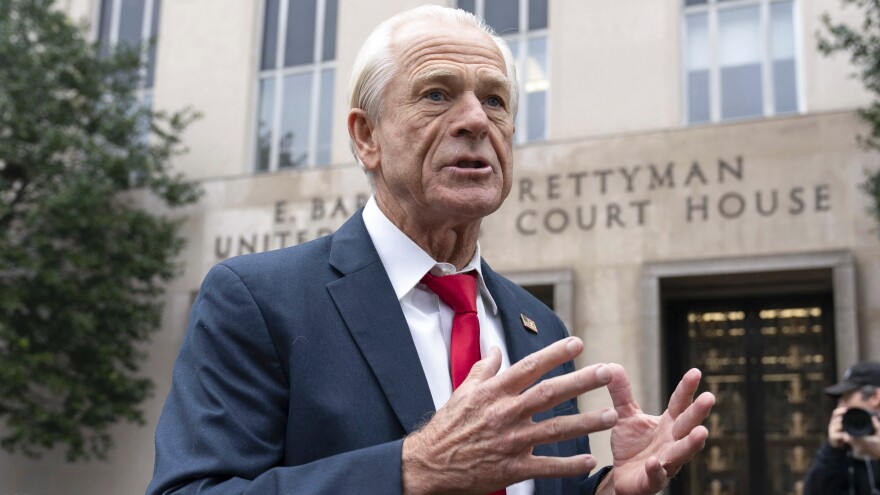Former Trump White House official Peter Navarro was sentenced Thursday to four months in prison for contempt of Congress for defying a subpoena from the House committee investigating the Jan. 6 U.S. Capitol attack.
Navarro, who served as a trade adviser in the Trump administration, was convicted in September of two counts of contempt of Congress for refusing to comply with a congressional subpoena for documents and testimony related to the Jan. 6 Capitol riot.
He is the second former Trump insider to be convicted and sentenced for contempt of Congress. Steve Bannon was found guilty in 2022 of the same charges and sentenced to four months in prison. Bannon has appealed his conviction.
"You are not a victim. You are not the object of a political prosecution. You are not," Judge Amit Mehta told Navarro as he announced the sentence. "You have received every process you are due. Every process."
"Your obligation as an American is to cooperate with Congress, to provide them with the information they were seeking," Mehta added. "They have a job to do, and you made it harder. It's really that simple. It wasn't a kangaroo court. The public could see that."
In addition to the four-month sentence, Mehta also ordered Navarro to pay a $9,500 fine.
Prosecutors had asked the court for a six-month sentence.
At Thursday's hearing, prosecutor John Crabb argued that Navarro "believes he is above the law."
"The defendant brazenly defied Congress," Crabb said. "The behavior cannot be countenanced."
The defense, which has argued that executive privilege shielded Navarro from having to testify or produce documents to the committee, had asked for probation. They are expected to appeal his conviction.
Navarro was not expected to speak at his sentencing, but ultimately did—against his attorneys wishes.
He told the court that when he received the congressional subpoena he had "an honest belief that the [executive] privilege had been invoked."
He said the House committee should have either called former President Donald Trump or his attorneys to confirm it, or the panel should have told Navarro that there was a dispute about executive privilege.
"If they wanted the information, one phone call. That's it. We wouldn't be here," Navarro said. "And if the lesson of this proceeding going forward is get a letter, get a lawyer, there's no need for this harsh punishment."
His attorney, Stanley Woodward, echoed that point, saying: "He need not be punished to prove a point. He acted the way he did because he thought he was duty-bound to do it."
"Forever more, presidential advisers will see this case as an advertisement of what not to do," Woodward added.
Ahead of trial, Judge Mehta denied Navarro's executive privilege line of defense, ruling that Navarro had not established that Trump directed Navarro not to cooperate or invoked executive privilege.
Mehta reiterated that point Thursday, saying that Navarro presented no evidence to confirm that Trump had invoked the privilege regarding Navarro.
At last year's trial, the jury heard testimony from just three witnesses, none of them for the defense.
Copyright 2024 NPR. To see more, visit https://www.npr.org.



